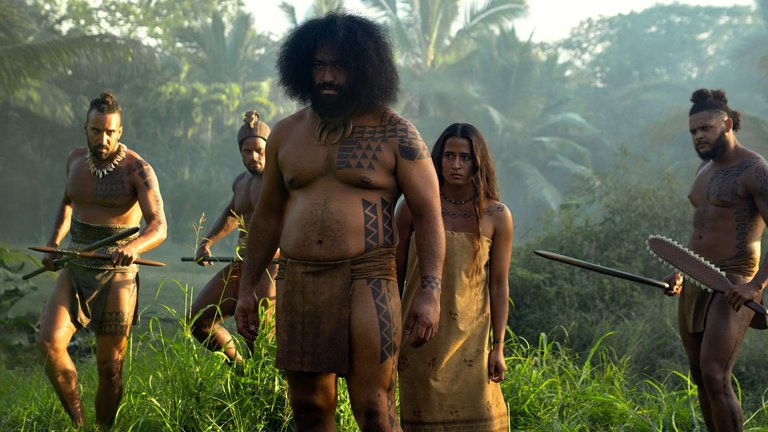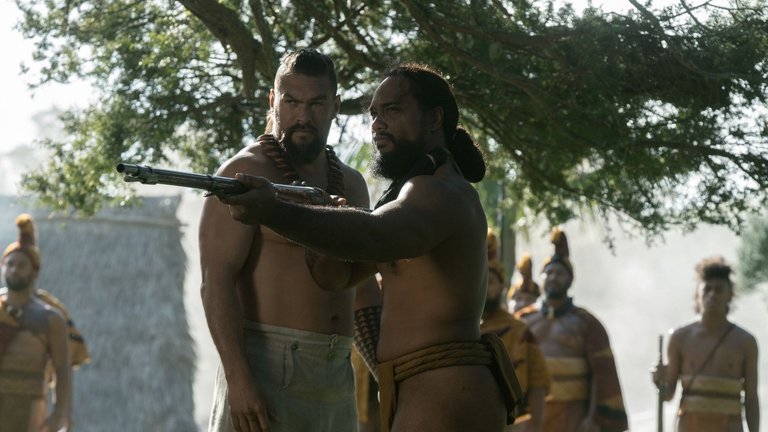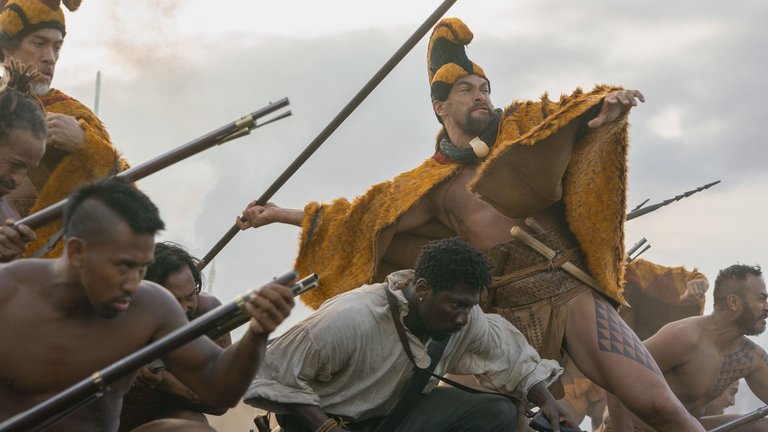Chief of War Review - An Attempt at Originality or a Hawaiian-Flavored Cliché? [ENG/SPA]
Lately, Apple TV's productions have really caught my attention. I've finished watching two, with the most recent being Chief of War. While this platform doesn't have the reach of others like Netflix, the quality of its stories has gotten a lot of critical and viewer praise, earning high approval ratings thanks to their authentic narratives and high-quality production.
Reseña de "Chief of War" ¿Un intento de originalidad o un cliché con sabor a Hawái?
Últimamente las producciones de Apple Tv me han llamado bastante la atención, he terminado de ver dos y la más reciente es Chef of War. Aunque esta plataforma no tiene el alcance de otras como Netflix, la calidad de sus historias ha llamado la atención de la crítica y de varios espectadores, logrando una alta aprobación, debido a lo auténtico de sus historias y su alta calidad de producción.

The story is set in 18th-century Hawaii, just before the islands were colonized. At that time, they were divided into four main kingdoms: Hawaiʻi, Maui, Oahu, and Kauaʻi, with the key detail being that they were in a state of constant war. The narrative follows Kaʻiana, played by Jason Momoa, a warrior chief of the Maui kingdom. He's well-known for his strength and great combat skills, with one major attribute: his loyalty to family.
La historia de desarrolla en el siglo XVIII en Hawái, justo antes que las islas sean colonizadas cuando estaba dividida en 4 principales reinos: Hawaiʻi, Maui, Oahu y Kauaʻi, con la particularidad que estaban en constante guerra. La narrativa sigue a Kaʻiana interpretado por Jason Momoa, que es un jefe guerrero del reino de Maui, muy conocido por su fuerza, gran destreza en combate, con un gran atributos: lealtad a su familia.

Kaʻiana has tried to live in exile, tired of the war, but it seems to find him again when his uncle Kahekili (Temuera Morrison), the king of Maui, summons him to lead his army once more. Kahekili is part of a larger conflict on the islands—a prophecy that foretells the arrival of a king who will unify them. He tries to manipulate this belief to bring chaos and rule, which is why he uses Kaʻiana.
Kaʻiana ha intentado vivir en el exilio cansado de la guerra, pero está parece alcanzarlo de nuevo cuando su tío Kahekili (Temuera Morrison) rey de Maui, le convoca para que líderes su ejército nuevamente. Kahekili es parte de un conflicto general que viven las islas, una profecía que predice la llegada de un rey que las unificar, así que intenta manipular está creencia para traer caos y gobernar, por eso usa a Kaʻiana.

However, Kaʻiana refuses and flees with his family to the Hawaiʻi kingdom. He falls into the ocean and is rescued by settlers, embarking on a years-long adventure where he learns their language, trade, and weapons. After this journey, he returns and eventually allies with Kamehameha (Kaina Makua), a chief in Hawaiʻi who preaches peace and reconciliation.
Kaʻiana, sin embargo, se niega y huye con su familia al reino Hawaiʻi pero el cae al océano y es rescatado por colonos, embarcandose en una aventura de años donde aprende su idioma, comercio y uso de sus armas. Tras este viaje regresa y termina aliado con Kamehameha (Kaina Makua), jefe dentro Hawaiʻi que predica la paz y reconciliación.

The series follows this civil war story, full of intrigue and political conflicts, until it reaches its most critical point: the threat of colonization to exploit the islands' sandalwood. It all culminates in a huge battle where traditional combat tactics are combined with Western settlers' weapons. This happens after many dramatic moments, like the coronation of the ambitious King Kayoa and the intervention of Kahumanu (Luciane Buchanan), Kamehameha's wife.
La serie sigue esta historia de guerra civil llena de intrigas y conflictos políticos hasta llegar su punto más álgido, la amenaza de la colonización para explotar el sándalo de las islas, y una gran batalla donde sus tácticas de combate tradicionales se combinan con las armas de los colonos occidentales. Todo esto tras muchos momentos dramáticos como la coronación del rey ambicioso Kayoa y la intervención de Kahumanu (Luciane Buchanan) la esposa de Kamehameha.
As a history buff, I appreciate the show's great efforts to tell the islands' story with a cultural immersion that goes beyond just spears and fighting. You can see Momoa's effort to present a character more connected to his roots, a result of him being a co-creator and writer. Because of this, much of the dialogue is in the Hawaiian language with a mainly Polynesian cast, which makes it more appealing due to its authentic feel.
Cómo fanático de la historia, agradezco los grandes esfuerzos de la serie por contar la historia de las islas con una inmersión cultural más allá de solo lanzas y combate. Se nota el esfuerzo de Momoa por presentar un personaje más conectado con sus raíces, obligado por ser cocreador y guionista. Por esto gran parte del lenguaje hablado es el hawaiano con un reparto principalmente polinesio, garantizando así mayor atractivo por el aspecto genuino que presenta.

I really liked that the set designs are from Hawaii and New Zealand. We get to see the great mountains and volcanoes, the lava fields, and their beautiful beaches. On top of that, the combat is brutal and very realistic. I love that they use Lua, the Hawaiian martial art, which gives the fight scenes a distinctive touch because it's something new you haven't seen in other shows or movies.
Me gustó mucho que la escenografía es hawaiana y de nueva Zelanda, vemos las grandes montañas y volcanes, los campos de lava y sus hermosas playas. A eso le sumas la brutalidad de los combates, con mucho realismo, me encanta que usen el Lua que es el arte marcial hawaiano, lo que le da a las escenas de pelea ese toque distintivo, porque es algo nuevo que no haz visto en otra serie o película.

Not everything about the series is great, though, especially since it has a high bar to clear, coming out after a show like Shōgun, which champions authenticity and a commitment to culture that truly sets it apart. One of the biggest flaws for me was the time jump in the third episode. After living with the Westerners for so long, Momoa's character learns so many things, but we don't know how. You're just expected to assume it, which would have been different if they had dedicated at least one episode to that period. It's also not clear how long he was away—they say it was a year, but it seems longer.
No todo es bueno en la serie, es que tiene la barra muy alta, tras salir luego de series como Shōgun que defiende su autenticidad y un compromiso con la cultura que la distingue. Uno de los grandes fallos para mi fue el salto temporal del 3er episodio, tras vivir tanto tiempo con los occidentales, el personaje de Momoa aprende tantas cosas, pero no se sabe como, asi que debes asumirlo, cosa que hubiera sido diferente si dedicaban por lo menos un episodio a ese espacio de tiempo, cosa que tampoco queda clara porque se menciona que estuvo alejado un año, pero parece más.

Another thing I couldn't ignore, knowing Momoa's acting career, is that he seems to be typecast. The character of Kaʻiana feels a lot like his Khal Drogo from Game of Thrones. He's the same kind of tough guy he always plays. He failed to create a memorable character, even though the real history of Kaʻiana demanded it, so he just played it safe and did what he's used to doing.
Otro aspecto que no pude pasar por alto, conociendo la trayectoria artística de Momoa, es que parece encasillado en un estilo de actuación. El personaje de Kaʻiana se me parece mucho a el de Khal Drogo de Games of Thrones, es el mismo tipo rudo que siempre suele hacer, no fue capaz de crear un personaje memorable, porque la historia real de Kaʻiana lo exigía, así que se fue por lo seguro, lo que está acostumbrado hacer.

I also really disliked the change in tone at the end of the season, specifically in the last few minutes of the final episode. Strangely, the director decided to include all the sex and nudity they could in a single scene, because there was none in the whole series before that. It felt like a Game of Thrones episode and was completely out of place. I had invited my son to watch it with me because it seemed like a wholesome, history-focused show, and then they ruined it at the end with that.
También me desagrado mucho el cambio de tono al final de la temporada, exactamente en los últimos minutos del último capítulo, extrañamente al director le dio por incluir todo el sexo y la desnudez que pudo en una sola escena, porque en toda la serie no lo hubo, esto se sintió como un episodio de Games of Throne, porque estuvo muy fuera de lugar, ya había invitado a mi hijo a verla conmigo porque parecía una serie sana centrada en la historia, para la manchan al final con esto.
But I can say that overall, it's a good and somewhat emotional series. If you're into history and want to learn about how the Hawaiian islands came to be what they are, it's a great experience, worthy of a binge-watch. Plus, the door is open for a continuation. There's definitely more to tell, especially about Western colonization, so we can expect more from Chief of War.
Pero puedo decir que en línea general es buena y un tanto emotiva, si te gusta un poco la historia y conocer como las islas de Hawai llegaron a ser lo que son, es una buena experiencia, digna de ser maratoneada, además, queda la puerta abierta para una continuación, claro que hay más por contar, sobre todo el lado de la colonización occidental, así que podemos esperar más de Chief of War.
All media from https://www.apple.com/tv-pr/originals/chief-of-war/ Copyright © 2025 Apple Inc. All rights reserved
El episodio final creo que lo dirigió también Momoa. La escena de la orgia no aporta nada, también me choco un poco. El encasillamiento de Momoa es cierto, en otra serie donde el es protagonista, que son ciegos, también hace un personaje similar, peor es que su físico es el ideal para eso.
La batalla final estuvo buena todo queda abierto para una nueva temporada. Están esperando que Apple tv de la confirmación.
Espero te este gustando Terminal List Dark Wolf y cuando puedas mira en HBO la nueva mini serie TASK, es de los mismos creadores de Mare of Easttown
Si me gustó la batalla final, aún hay mucho que contar la historia real me gusta, el tema es por dónde la van a llevar sabiendo lo que le pasa al personaje de Momoa, así que ojalá la confirmen.
La lista terminal está demasiado buena, esperando que termine para dejar la reseña. Y ya me dejaste intrigado con esa Task, ya la busco....
Hmmm. I have not watched many historical series like this. But your review begs that I see first, Shogun and then this one. I might just be ruining it for myself…
Deraaa
It's a matter of what you like
Interesante reseña. Muy buena, clara y concisa. Me gustó leerla. Gracias por compartir.